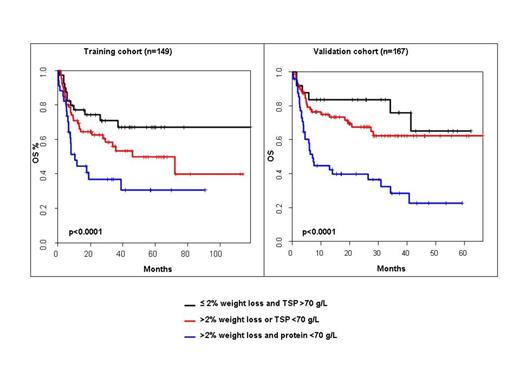Abstract
Although allogeneic stem cell transplantation (alloSCT) represents a curative chance for higher risk acute myeloid leukaemia (AML), relapse occurs in a significant proportion of patients. The impact of nutritional status on the outcome of allogeneic stem cell transplantation (alloSCT) is controversial. This study investigates the influence of pre-transplant body mass index (BMI), weight loss, and serological indicators of nutritional homeostasis on relapse and death of acute myeloid leukemia (AML) after alloSCT.
Pre-transplant weight loss and BMI along with serum levels of total serum protein (TSP), albumin, C-reactive protein, and leptin were collected retrospectively in a training cohort of 149 patients allografted for AML and correlated with clinical outcome. A metabolic risk score was established and tested in an independent validation cohort (n=167).
Pre-transplant weight loss exceeding 2%, TSP lower than 70 g/L, and decreased leptin levels were associated with a significantly increased risk of relapse and death. In contrast, we did not observe a consistent pattern for the impact of nutritional indicators on non-relapse mortality (NRM). Multivariate analyses adjusting for age, cytogenetic risk, treatment line, blast count at alloSCT, donor, and conditioning confirmed weight loss and low TSP as independent risk factors of relapse and overall survival, but not of NRM. Weight loss >2% and low TSP were used to build a metabolic score for prediction of relapse risk and mortality. In multivariate analyses with clinical confounders, patients with both metabolic risk factors had a strongly increased risk of relapse (p=0.0003, HR 15.62, 95%CI 3.51-69.71) and death (p=0.002, HR 3.64, 95%CI 1.62-8.18) compared to patients without metabolic risk factor. The risk prediction of the metabolic score could be confirmed in the validation cohort (Figure 1).
Altered nutritional homeostasis prior to alloSCT predicts the risk of recurrence of AML after transplantation. Studies addressing pretransplant nutritional interventions in order to reduce AML relapse rates are warranted.
No relevant conflicts of interest to declare.
Author notes
Asterisk with author names denotes non-ASH members.


This feature is available to Subscribers Only
Sign In or Create an Account Close Modal